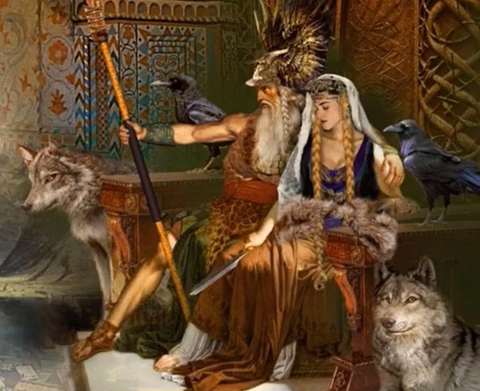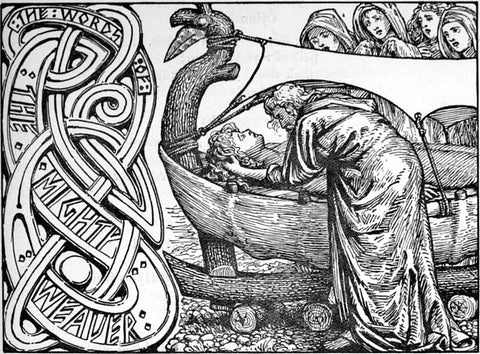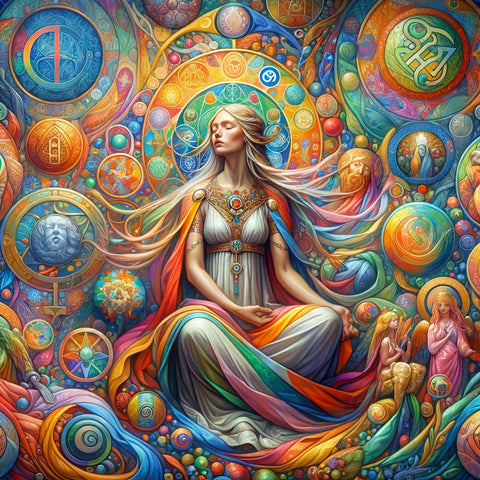🎁 Enjoy 10% off with code VIKING10
🎁 Enjoy 10% off with code VIKING10
¿Quién es la diosa Frigg?
abril 08, 2024 4 lectura mínima

Frigg: Diosa del amor, el matrimonio y la fertilidad.
La mitología nórdica, entretejida a partir de grandes epopeyas y fascinantes figuras divinas, presenta a Frigg como la encarnación del poder femenino en su más pura esencia. Elevada a la condición de esposa de Odín , padre de todos los dioses, y madre de Baldur , el luminoso, reina como diosa del amor, el matrimonio y la fertilidad .
Su presencia en el panteón nórdico no se limita a una influencia pasiva; está en el corazón de las creencias y los rituales que dan forma a la vida y la muerte, el amor y la pérdida. Frigg, en su papel divino, teje los lazos del destino, protege las uniones sagradas y vela por la continuidad de la vida a través de las generaciones. Su historia y sus poderes no son solo cuentos antiguos, sino ecos vivos de los valores y las esperanzas que animaron a las sociedades nórdicas.
La esencia divina de Frigg y su influencia en los dioses nórdicos

Ocupando un lugar de honor dentro de Asgard, Frigg destaca por su papel como consejera y apoyo de Odín , el todopoderoso jefe de los dioses.
Dotada de una visión de futuro sin igual y de una profunda sabiduría, Frigg aconseja a Odín y guía a los dioses, evitando conflictos y dando forma al destino. Como diosa de la fertilidad, también es venerada por su poder de dar vida, simbolizando la continuidad y la prosperidad del universo nórdico. Su amor y devoción hacia sus hijos, en particular hacia Baldur, revelan una profunda dimensión maternal, enfatizando el valor de la familia y la protección dentro de esta mitología.
Los poderes y símbolos asociados con Frigg
En el corazón de la mitología nórdica , los poderes de Frigg están envueltos en misterio y un profundo simbolismo, lo que refleja su condición de deidad multifacética. Entre sus dones más notables se encuentra la capacidad de ver el futuro , un talento que coloca a Frigg en una posición única entre los Aesir. Esta previsión, sin embargo, está teñida de una dulce amargura, ya que sabe que algunos destinos no se pueden alterar, ni siquiera por voluntad divina. Esta aceptación del destino inevitable le otorga a Frigg una gravedad y una profundidad excepcionales, lo que ilustra el tema omnipresente del destino en la mitología nórdica.
Los símbolos que la acompañan son igualmente elocuentes, siendo el huso y la rueca entre los más significativos. Estos objetos, aunque de apariencia sencilla, están cargados de significado, ya que representan no solo la creación y el control del destino, sino también el aspecto inevitable y entrelazado de la vida. Frigg, al hilar los hilos del destino, actúa como guardiana del futuro de todos los seres, un papel que subraya su importancia dentro del panteón nórdico.
Además, la práctica de la cetrería, simbolizada por el halcón , revela otra capa de su personalidad y poderes. El halcón, capaz de volar alto en los cielos, sirve como metáfora de la visión y la perspicacia de Frigg, destacando su papel como vidente divina.
La tragedia del papel de Baldur y Frigg en el preludio de Ragnarok

La trágica historia de la muerte de Baldur es un momento crucial en las narraciones nórdicas, que ilustra la complejidad de la naturaleza divina y el peso del destino. Frigg, en sus esfuerzos por proteger a su amado hijo, moviliza todos los elementos de la creación para jurar no dañar a Baldur. Este enfoque, un testimonio del amor inconmensurable de una madre, resalta la dualidad de su poder: aunque inmenso, también está marcado por los límites de la predestinación. El descubrimiento de una escapatoria, el muérdago, por parte de Loki , sirve como un cruel recordatorio de que incluso los dioses no pueden superar al destino.
La caída de Baldur, orquestada por el ingenio malicioso de Loki, resuena con particular intensidad en toda la mitología nórdica, señalando no solo una pérdida inmensa para Frigg y los otros dioses, sino también la inexorable proximidad del Ragnarok . En este momento de duelo y caos inminente, el papel de Frigg demuestra ser de crucial importancia. Ella se erige como el símbolo de la pérdida inevitable y como la guardiana de la esperanza, encarnando la fuerza que persiste frente a la adversidad y el cambio.
Al ahondar en estos aspectos de Frigg, percibimos una diosa cuyos atributos, símbolos y narrativas entrelazadas siguen fascinando e inspirando, ofreciendo una visión rica y matizada de la feminidad divina en la mitología nórdica. Su historia, marcada por el poder, la sabiduría y la tragedia, sigue resonando, ilustrando los temas universales del amor, el sacrificio y la resiliencia.
Frigg: un símbolo atemporal de amor y fertilidad

En medio de las pruebas y tragedias que marcan su existencia y la de su familia, Frigg emerge con una resiliencia y un poder inquebrantables, encarnando la esencia misma del amor, la fertilidad y la fuerza protectora. Su lealtad inquebrantable a su familia y su compromiso como guardiana de los vínculos matrimoniales y familiares le confieren un lugar de honor en los corazones de los fieles. Venerada a través de los siglos, Frigg es celebrada por su amor incondicional, su profunda sabiduría y su capacidad para proteger a quienes están bajo su cuidado .
Su influencia trasciende los siglos, ofreciendo un puente entre el pasado mítico y el presente, encarnando la fusión del amor, la pérdida y el renacimiento en el ciclo eterno de la vida.
Más allá de las narraciones mitológicas, Frigg destaca como una figura fundamental en la mitología nórdica, un espejo de los ideales y aspiraciones de la sociedad que la veneraba. Su leyenda, tejida a partir de intrigas divinas y momentos de profunda humanidad, continúa cautivando e inspirando, ilustrando la complejidad y riqueza de una mitología que habla tanto de la fragilidad como de la fuerza de la existencia. Su presencia en la cultura moderna, como símbolo del amor eterno y la fertilidad renovada, da testimonio de la marca indeleble que deja en nuestro patrimonio cultural, recordando a cada generación los valores del amor, la devoción y la protección que definen la esencia misma de la deidad.
Dejar un comentario
Los comentarios se aprobarán antes de mostrarse.




